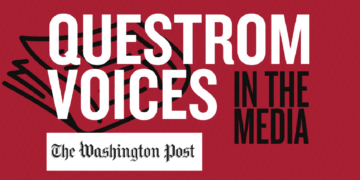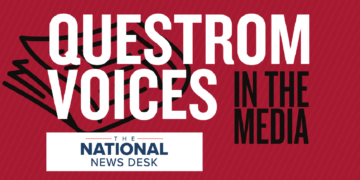Investments and savings expert Zvi Bodie on how the coronavirus crisis exposed long-standing faults in our retirement system—and how to fix them.
By Andrew Thurston
—
Retirement now seems a lot further off. The economic crisis sparked by COVID-19 lockdowns has decimated many retirement and pension plans—years of investments and gains disappearing with the stock market’s collapse. Millions, newly unemployed, have other, more immediate, financial priorities than saving.
Like the exasperated public health experts who warned for months, even years, of the prospect of a pandemic, Zvi Bodie has long cautioned that our retirement system was ill-prepared to withstand a disaster.
The author of multiple books and textbooks on investing, Bodie taught finance at Questrom for 43 years before retiring in 2015. For decades, he has advocated an investment approach light on risk: “safety-first investing,” as he and his coauthor, Rachelle Taqqu, put it in the 2011 book Risk Less and Prosper. Instead of plunging everything into one retirement fund, for instance, Bodie suggests diversifying portfolios to insure against risk, hedging with bonds and other products with guaranteed returns, and keeping an emergency fund for when things don’t go according to plan—like when a crisis (or pandemic) hits. In short, everything most of us have not been doing.
During his career, Bodie served on the editorial board of the Journal of Pension Economics and Finance, as an advisory member to the World Bank Project on Old Age Security, and as a consultant to the State of Israel on reform of its pension system. In 2007, the Retirement Income Industry Association gave him a lifetime achievement award.
A professor emeritus of finance, Bodie continues to consult and share his expertise to help investors dig savings plans out of deep holes—and ensure they can withstand future crises. He is a frequent media presence—in Forbes, Bloomberg Businessweek, and others—speaking about retirement and investments.
We spoke with Bodie about what all of us, no matter our life stage, should be doing with our retirement funds today—and whether we should rethink how we save for retirement in the future.
Questrom: You’ve talked about retirement investment risks for years. What should we have been doing before this crash?
Bodie: I was on a conference call earlier today with some of the people at TIAA, which is the Teachers Insurance and Annuity Association of America—that’s where I have my retirement money. They offer a traditional retirement plan where you earn a guaranteed minimum interest rate. And then, if their portfolio performs well, there’s a board of directors and they decide on a kicker, an additional return. That, to my mind, is exactly what every retail consumer, people like you and me, really needs. Because for the most part, the average person knows nothing about investing and should not be exposed to the downside of the markets.
Many of us trust big financial services companies to manage our retirement plans. Should we?
That’s misplaced trust. What all of these companies say is, in the long run, just have faith in the stock market—invest and you’ll be okay. What other product would you buy as a consumer without a warranty? Would you just take whatever they say to you about it and then you bear the risk? How about a vacuum cleaner? How about a refrigerator? How about an automobile?
Isn’t the COVID-19 pandemic a risk that nobody could have planned for?
What does it mean to plan for risk? What we do is we insure. You know of some other way of planning for risk? But these firms are not selling insurance. In fact, they’re saying you don’t need insurance. Now, in the case of investments, insurance is essentially a put option. How many people out there who are investing for retirement and other long-term goals even know what a put option is?
Not many.
Most people are not going to go to the trouble of figuring out all of these things. Financial risk management is a very complicated subject. It’s like medicine. In order to stay healthy, do we all have to become experts in medicine? I don’t think so. But we have to trust the people who are telling us what the healthy things to do are. The experts can differ, but at least they pretty much know what they’re talking about; they certainly know more than I do. But what I don’t want is for them to say to me, “Okay, you need to go to a website where we’re going to teach you medicine, and then you’re going to make your own decision.”
You’ve talked about four basic strategies that people should have when it comes to retirement: diversify, hedge, insure, and keep an emergency fund. How should they go about that?
First of all, you need to have some savings, even if it’s just an emergency fund. An emergency fund is where you start and then you build it up gradually. You need a retirement fund as well. But if you invest in something like Series I Savings Bonds, that’s good for both. I’ve written quite a lot about Series I Bonds. I call them the best-kept secret in America.
Why aren’t more people using them?
Because nobody knows about them. Financial planners don’t tell you about them, because there’s nothing in it for them. These are online accounts that you have with the US Treasury. And the US Treasury doesn’t market them. They’ve got a website, but you have to know how to get there and then you have to navigate it. Again, there are certain analogies with medicine. There are therapies or certain things you can do that cost next to nothing—is that what drug companies are trying to promote?
Why do you think I Bonds are so attractive as an investment tool?
What more can you want? They’re fully inflation-protected accounts. And they never can lose money. In fact, they can’t lose purchasing power. And even though the interest rate is very low now, it’s better than anything you’re going to get at the bank. And a bank account is not inflation-protected—these are. And you get the full faith and credit of the US Treasury.
Many people planning to retire this year or planning to retire next year are probably finding themselves in a deep hole. What would be your next step if you were in that situation?
Well, if you are in a deep hole, you can’t retire. So you have to ask yourself, do you have any assets: if you own your home, then you may have to downsize or you may have to take out a reverse mortgage. Many households are going to have to find part-time work. I have two sisters in Boca Raton, Fla., and they don’t think they’re going to be able to retire. All over Florida, you find elderly people pumping gas, serving as watchmen, doing all sorts of service jobs to earn some money.
Do we, as a society, need to start adjusting our idea of what retirement looks like?
I think that’s right. But if you have any kind of historical context, where the hell did the idea of retirement come from? That’s a very modern idea. It used to be you contributed as long as you could. When 90 percent of the population was working in agriculture, everybody worked. I think retirement is going to fade. We’re going to think of it as a period of time when there was a need to get elderly people to retire so that younger people could take their place in the industrial society. And as the economy changed, and as the demographics changed and there was a need for elderly people to stay productive, retirement disappeared.
What’s your advice for people at the start of their careers—and who still like the idea of retiring at 65?
What I think makes sense is to plan a life where you’re going to have perhaps several careers. And you’re certainly going to strive to find that occupation that you enjoy—in which case you wouldn’t want to retire. And I don’t see why people couldn’t take sabbaticals in mid-career; they don’t have to wait until they’re 65 or 70 to take time off. My vision is actually, I think, a rather benign one.
How about those people who are mid-career—and perhaps have a target date retirement fund—what should they do next?
The first thing they should do is ask themselves, does that make any sense at all? All the mutual funds have so-called target date funds. Now, do you have any idea what fraction of the Fidelity 2020 Fund—the one that had 2020 as a target date—was invested in stocks? More than 50 percent. What has happened to the value of those stocks? Now, does Fidelity take any responsibility for fulfilling any of your needs? So, what was the whole idea behind this? If that person put in $10,000 per year, which is the limit, into I Bonds, they’re going to have quite a bit of money in I Bonds by the time they retire—and that’s tax deferred. They don’t have to pay any taxes on the interest accruing until they cash out. And there are no penalties for cashing out early. So why not put your money there instead of a plan where you’re going to be penalized if you take money out?
This conversation has been edited and condensed for clarity.




















![[Deutsche Welle] The Scientific Innovation Sparked by the Pandemic](https://insights.bu.edu/wp-content/uploads/QUESTROM-EXPERTS-1-360x180.png)


